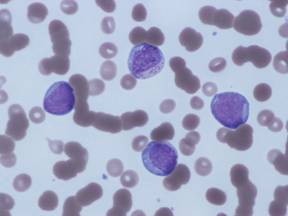Blood Count
At diagnosis:
- Median WBC count = 20 X 109 /L (may be increased, decreased or normal)
- Median Hb = 8 g/dL
- Median platelet count = 70 X 109 /L
Leukemic blasts are present in peripheral blood smear in most cases. The peripheral blood film below shows numerous blasts (large blue cells):

Blast morphology:
- Medium to large in size, with variably abundant cytoplasm.
- Cytoplasm generally has a ground glass appearance, although some blasts have a distinct red granularity.
- Nuclear margins are mildly irregular and chromatin is very fine.
- Red blood cells show mild anisopoikilocytosis, including teardrop cells.
- The morphology of the mature neutrophil is very abnormal with a large majority of the neutrophils being uni-lobated.
- Lymphocytes are morphologically unremarkable.
- Platelets are somewhat hypogranular.
Clotting Studies
In 5% of patients there is evidence of disseminated intravascular coagulation (DIC) at diagnosis with:
- Prolonged prothrombin, thrombin and partial thromboplastin times
- Decreased fibrinogen levels
- Increased circulating fibrin degradation products
DIC is more commonly seen with M3, M4 and M5 AML types, very increased white cell count (hyperleucocytosis) and infection.
Serum Biochemistry
Biochemical abnormalities seen in acute leukemia:
|
Possible abnormality |
Cause |
Potassium |
Increased |
cell lysis |
Phosphorus |
Increased |
cell lysis |
Uric acid |
Increased |
cell lysis |
Calcium |
Decreased |
binds with phosphorus |
Creatinine |
Increased |
Lysozyme released from AML blast cells and causes renal tubular dysfunction. |
LDH |
Increased |
increased cell turnover |
Serum albumin |
Decreased |
|
Radiology
Chest X-ray is usually normal. Mediastinal masses are not commonly seen in AML.
Bone Marrow Aspiration
The diagnosis is made by bone marrow aspiration and biopsy.

